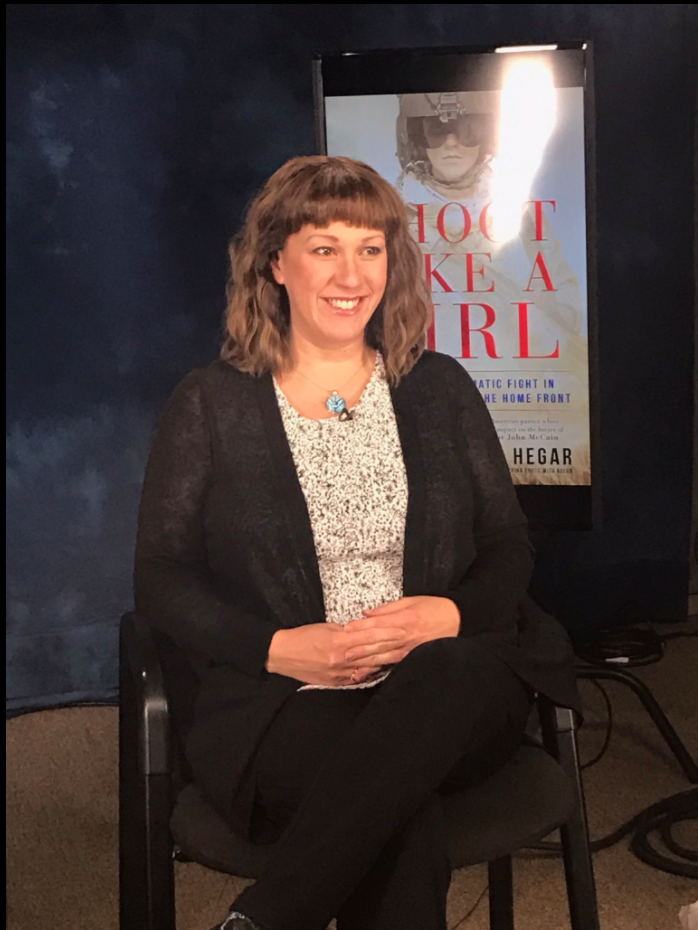Afghan War Hero Details Battle Against Armed Forces Sexism

Mary Jennings Hegar is a decorated Air Force helicopter pilot and combat veteran. But in the pages of her autobiography, Shoot Like a Girl, out this month through Penguin Random House, she tells the story of another fight: one against the entrenched sexism of the armed forces.
Hegar grew up in Texas and, at 4 years old, witnessed her father abusing her mother. This would be a critical moment for Hegar and one she credits with her decision to pursue a career in the military.
“When someone calls me brave,” she writes, “I think: ‘Hell, flying helicopters under fire in Afghanistan is nowhere near as scary as the thought of being that little girl again.’”
But it was a long and difficult process to go from green cadet to seasoned pilot. And Hegar, who is now 41, battled a bias against women in the armed forces all along the way. She recalls being told to skip an obstacle course during basic training. She disobeyed that order and ran to the head of the line. While jumping onto a rolling log, however, she fell and cracked her kneecap. She describes the pain as unbearable, but after a drill sergeant told her that if she passed out she would never be able to fly, she willed herself to stay conscious.
This is just one of many trials Hegar would face throughout her career, and some of the most trying would come far from a battlefield or training ground.
She recalls an episode in which a military physician not qualified in gynecology insisted on giving her an exam during her annual physical. Hegar protested, but the doctor replied, “I can fail you for psychological reasons. You can kiss being a pilot goodbye.”
Even though the incident later came to light, the doctor faced no serious punishment. In fact, Hegar would run into him later at an awards ceremony. He was being honored as the Medical Group’s Company Grade Officer of the Year.
When she finally reached Afghanistan in the spring of 2007 she was ready to show what she could do. She served one tour flying rescue missions out of a small Dutch base in Kandahar. But it was during her second tour in 2009 that she would truly be tested.
On July 29 of that year, the call came in that three American soldiers had been seriously injured by a roadside bomb. Hegar and her crew, as well as another helicopter crew, rushed to the scene.
They found a convoy of Army vehicles under heavy fire from Taliban insurgents. It was then that Hegar heard a crack; a windshield had been knocked out. She looked down to see blood seeping through her pant leg and down her forearm. “I’m hit, but I can still fly!” she told her co-pilot, and circled the helicopter around in an attempt to pick up the wounded soldiers.
As the copter touched down, the second phase of the ambush began, and the Taliban fighters peppered the helicopter with small-arms fire. Despite the withering attack, Hegar’s crew loaded the wounded Americans and took off. They’d spent too much fuel, however, and were forced to make an emergency landing in the hills. Hegar disembarked and took up a defensive position, rifle in hand.
The second helicopter hovered high above but refused to land, and the pilot said he couldn’t continue with the mission. “All of us who had done tours in Afghanistan had seen someone lose their courage,” Hegar writes. “There was no coming back from that.”
Fortunately, rescue wasn’t far behind, and more helicopters soon arrived. “It was the most beautiful sight I had ever seen,” recalls Hegar.
Back at the base, Hegar refused to let medics examine her wounds. She was so wound up from the ordeal that it took a few minutes for them to convince her that she needed medical attention.
“I’m not sure they noticed I was a woman under all that body armor and helmet,” writes Hegar. “Now they stared openly — at my Hello Kitty panties.” A soldier Hegar calls “JT,” who had just flown on the same mission, walked up to a gawking onlooker and said “What the F*** are YOU looking at?”
After that, no one doubted Hegar’s abilities, or courage, ever again.
Hegar received a Purple Heart and retired from the Air National Guard in 2010 at the rank of major. She’d suffered a severe back injury in the Kandahar mission and was about to be married to a man she’d met years before in the service.
In 2012 she would file a class-action lawsuit against the secretary of defense with the aim of allowing women to serve in combat. In the following year, then-Defense Secretary Leon Panetta lifted the ban on females in combat roles, but Hegar remains an outspoken advocate for women in the military.
Read more from Yahoo Style + Beauty:
Sexist Men Might Be More Likely to Have Mental Health Problems, Study Suggests
Women Can Now Serve in U.S. Combat Roles, Despite Opposition
Follow us on Instagram, Facebook, and Pinterest for nonstop inspiration delivered fresh to your feed, every day. For Twitter updates, follow @YahooStyle and @YahooBeauty.

